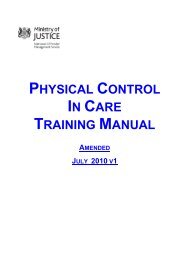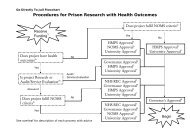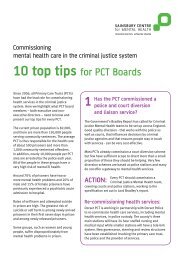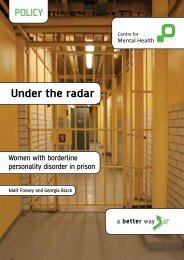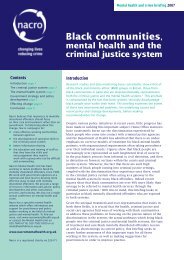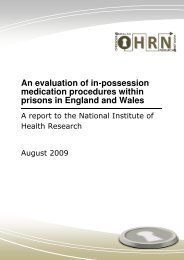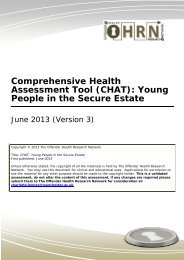The Bradley Report and the Criminal Justice workforce - Centre for ...
The Bradley Report and the Criminal Justice workforce - Centre for ...
The Bradley Report and the Criminal Justice workforce - Centre for ...
- No tags were found...
You also want an ePaper? Increase the reach of your titles
YUMPU automatically turns print PDFs into web optimized ePapers that Google loves.
2require a better underst<strong>and</strong>ing of what in<strong>for</strong>mationis needed by each agency <strong>and</strong> when, so thatindividuals are not constantly reassessed <strong>and</strong> rediagnosed,or shuttled between services due to lackof in<strong>for</strong>mation. This would also ensure a reduction induplication of ef<strong>for</strong>t <strong>and</strong> maximise efficiency.National <strong>work<strong>for</strong>ce</strong> planning: we need a centralisednational strategic approach to provide impetusacross <strong>the</strong> sector to work toge<strong>the</strong>r, <strong>and</strong> to ensurethat high st<strong>and</strong>ards of per<strong>for</strong>mance <strong>and</strong> servicedelivery will be met by a highly trained <strong>and</strong> flexible<strong>work<strong>for</strong>ce</strong>.1.Are people across <strong>the</strong> <strong>Justice</strong> sectorreceiving <strong>the</strong> appropriate <strong>and</strong> rightamount of training in terms of mentalhealth <strong>and</strong> learning disabilities?<strong>The</strong> <strong>Bradley</strong> <strong>Report</strong> identified a number of areasof good practice in this area, but made <strong>the</strong> pointthat <strong>the</strong>re is not yet a consistent approach. <strong>The</strong>reis a great deal of investment in <strong>the</strong> skills of <strong>the</strong><strong>work<strong>for</strong>ce</strong> across <strong>Justice</strong>, but inspectorate reportshighlight repeatedly <strong>the</strong> need to meet <strong>the</strong> mentalhealth needs of offenders, <strong>and</strong> those at risk ofoffending. Skills <strong>and</strong> knowledge are needed atall levels to ensure fair treatment of vulnerableindividuals <strong>and</strong> to enable diversion from offending.We support <strong>the</strong> recommendations in <strong>the</strong> <strong>Bradley</strong><strong>Report</strong> on training <strong>for</strong> policing teams, <strong>the</strong> judiciary,court staff <strong>and</strong> all those dealing with individualsat risk of offending. We believe that betterunderst<strong>and</strong>ing <strong>and</strong> awareness of mental healthissues will support wider ef<strong>for</strong>ts to ensure thatpeople are treated in <strong>the</strong> most appropriate way,<strong>and</strong> diverted from <strong>the</strong> criminal justice systemwhere possible.<strong>The</strong> Government’s Delivery Plan states that: ‘Training<strong>and</strong> development will focus on all front-line criminaljustice staff across <strong>the</strong> pathway <strong>and</strong> also healthstaff working within <strong>the</strong>se areas. This will ensurethat <strong>the</strong>re is appropriate staff competence at <strong>the</strong>interface between health services <strong>and</strong> <strong>the</strong> criminaljustice system. Where possible, training should bedelivered jointly between services to encouragepartnership working, <strong>and</strong> developed in conjunctionwith service users’ (para 2.33). As a response tothis, we would like to see <strong>the</strong> adoption of a sharedapproach to tackling <strong>the</strong> needs of offenders <strong>and</strong>vulnerable people, based on <strong>the</strong> level of contact withindividuals.This could be delivered through a tiered frameworkapproach with initial awareness raising <strong>and</strong>underst<strong>and</strong>ing of referrals delivered across <strong>the</strong>board to all those in contact with individuals, at Tier1. This would include those working in frontline <strong>and</strong>public facing roles, <strong>for</strong> example: court clerks, policecommunity support officers, neighbourhoodpolicing teams <strong>and</strong> immigration officers. Morespecialist learning <strong>and</strong> development could beembedded into training at higher levels. Tiers 2<strong>and</strong> 3 may be more appropriate <strong>for</strong> those requiringgreater underst<strong>and</strong>ing of <strong>the</strong> needs of offenders <strong>and</strong><strong>The</strong> tiered framework approachTier 4specialist training <strong>for</strong> those in<strong>Criminal</strong> <strong>Justice</strong> Mental Health TeamsTier 3underst<strong>and</strong>ing <strong>the</strong> needs of <strong>and</strong> workingwith individuals, issues of dual diagnosisTier 2knowledge <strong>and</strong> underst<strong>and</strong>ing of rangeof referrals <strong>and</strong> treatmentsTier 1general awareness raising <strong>and</strong> assessment skills



